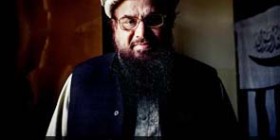A militant Korean nationalist has slashed the face of the US ambassador to South Korea at a breakfast meeting in Seoul, but the envoy narrowly survived serious injury.
Mark Lippert, 42, was also cut on his left hand, with blood spattered over the breakfast table.
Security officers subdued the attacker, one pinning him down with a shoe on his neck, until he was arrested.
North Korea described the attack as “just punishment for US warmongers”.
In a statement on state media, it said the attacker had delivered a “knife shower of justice”.
US Secretary of State John Kerry reacted by saying America would not be “intimidated or deterred by threats or by anybody who harms any American diplomats”.
The attacker, named as Kim Ki-jong, 55, appears to have broken his ankle during the attack and was taken away on an ambulance trolley after questioning.
Mr Lippert had hospital treatment but later wrote in a tweet: “Doing well and in great spirits… Will be back ASAP to advance US-ROK [Republic of Korea] alliance!”
Nobody believes that pro-North Korean groups represent a majority of South Koreans but they are still a significant minority and part of the political landscape.
In November, South Korea’s constitutional court ordered that the Unified Progressive Party be dissolved even though it had five members elected to parliament. The authorities said the UPP posed a threat to South Korean democracy. One of its leaders was jailed.
The counter-argument of the leftist nationalists is not so much that they want to be ruled by Pyongyang or fall under a North Korean system but that the American military presence in South Korea perpetuates a division within one people – the Korean people.
The strong feelings of pro-Pyongyang activists become most obvious when anti-Pyongyang activists launch balloons into the North loaded with propaganda messages. The two sides confront each other, with much jostling and shouting. There was a small pro-US demonstration after the attack on the ambassador but some on the streets of the capital said they applauded it.
South Korean President Park Guen-hye condemned what he called an “attack on the South Korea-US alliance”.
Local people held a protest against the attack outside the hospital where Mr Lippert was treated, waving placards which read “Mark Lippert, Cheer up!” and “Korea-US relationship is solid”.
Eighty stitches
The attack happened at about 07:40 local time (22:40 GMT Wednesday), as the ambassador was at a performing arts centre in central Seoul.
It took 80 stitches to close his facial wound, which was 11cm (just more than 4 in) long and 3cm deep, doctors said.
The cut did not affect his nerves or salivary gland, hospital spokesman Chung Nam-sik said.
Lew Dae-hyun, a plastic surgeon at Yonsei University’s Severance Hospital, said Mr Lippert had narrowly escaped having much more serious injuries.
“If the cut had been one to two centimetres deeper than it is now, it could have damaged the carotid on the upper neck, which could have turned it into a serious emergency situation,” he said. “It could have been life-threatening.”
Seoul is not considered to be a particularly high-threat post for US diplomats.






Leave a reply